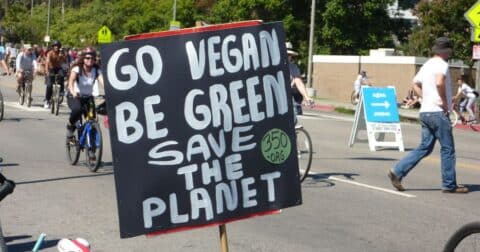News
People Can Give Cows Tuberculosis, But We Rarely Look For It
Health•5 min read
Explainer
A revealing thought experiment, investigated.


Words by Seth Millstein
As worldwide demand for meat and dairy continues to grow, so does the volume of evidence showing that animal agriculture, in its current form, is wreaking havoc on the environment. The meat and dairy industries are harming the planet, and some consumers looking to reduce their own impact have turned to veganism. Some activists have even suggested that everyone should go vegan, for the planet’s sake. But is global veganism even possible, from a nutritional and agricultural standpoint?
If the question seems like a far-out proposition, it’s because it is. Veganism has attracted more attention in recent years, thanks in part to advancements in lab-grown meat technology; however, it’s still not a very popular diet, with most surveys pegging vegan rates somewhere between 1 and 5 percent. The prospect of billions of people voluntarily deciding to jettison animal products from their diets seems, at best, vanishingly unlikely.
But just because something is unlikely doesn’t mean it’s impossible. Taking a closer look at the barriers to changing what we eat in big ways might shine a light on what it would mean to change them in small, yet beneficial, ones. Whether our planet remains hospitable is as high-stakes as it gets, and so it’s worth at least investigating whether, in practice, it would be possible for the world to subsist on a plant-based diet.
The viability of worldwide veganism is worth interrogating primarily because animal agriculture, as it’s currently structured, has a catastrophic and unsustainable impact on the environment. This impact includes not only greenhouse gas emissions but also land use, water eutrophication, soil degradation, biodiversity loss and more.
Here are a couple of fast facts:
Given animal agriculture’s outsized impact on planetary destruction — and the fact that plant agriculture, almost without exception, is far more environmentally friendly and better for the 100 billion animals who die in factory farms every year — this alone is reason to consider the plausibility of global veganism.
While the prospect of everyone eating plants might seem relatively straightforward, decoupling an industrial food system from farm animals is trickier than it sounds, for a number of reasons. Let’s take a look at some of them.
Feeding a vegan world would require us to grow many, many more plants than we do now. Is there enough suitable cropland on Earth to do that? More specifically: is there enough cropland to meet the nutritional needs of Earth’s population through plants alone?
Yes, there is, because plant agriculture requires far less land than animal agriculture. This is true in terms of the land required to produce one gram of food, and it remains true when taking nutritional content into account.
This is most striking for beef and lamb, which are by far the most land-intensive meats to produce. It takes around 20 times as much land to farm 100 grams of beef protein as it does to produce 100 grams of protein from nuts, the most land-intensive plant protein to farm. Cheese requires one-fourth as much land as beef to produce an equivalent amount of protein — and yet it still requires almost nine times more than grains.
There are a few minor exceptions to this. Nuts require slightly (around 10 percent) more land to farm than poultry meat, and fish of all kinds require less land to farm than almost any plant, for obvious reasons. These edge cases notwithstanding, farming plant-based protein is far more efficient than farming meat-based protein, from a land use perspective.
This same dynamic is true when comparing land use on a per-calorie basis, and here the differences are even more pronounced: farming 100 kilocalories worth of beef requires 56 times more land than farming 100 kilocalories of nuts.
But this isn’t the end of the story, as it doesn’t take into account differences in the types of land that are available.
Roughly half of the world’s habitable land is used for agriculture; about 75 percent of that is pasture, which is used for grazing by ruminant livestock like cattle, while the remaining 25 percent is cropland.
At first glance, this might seem like an easy puzzle to solve: just convert the pasture to cropland, and we’ll have plenty of land to grow the additional plants needed to feed a vegan world. But it’s not that simple: two-thirds of that pasture is unsuitable for growing crops for one reason or another, and thus can’t be converted to cropland.
But this isn’t actually a problem, because 43 percent of existing cropland is currently being used to grow food for livestock. If the world became vegan, that land would instead be used to grow plants for humans to eat, and if that were to happen, we’d have enough cropland to grow the plants necessary to feed humans on Earth, and much of the rest could be “rewilded” or returned to an uncultivated state, which would be a massive boon for the climate (more on the climate benefits of rewilding here).
That’s true because we’d actually have more than enough land: a fully vegan world would only require around 1 billion hectares of cropland, compared with the 1.24 billion hectares that’s needed to sustain our planet’s current diet. Add in the land savings that would come from the elimination of livestock pastures, and a fully vegan world would require 75 percent less agricultural land in total than the world we live in today, according to one of the largest meta-analyses of food systems to date.
Another potential obstacle to global veganism is health. Is it possible for the entire world to be healthy while only eating plants?
Let’s get one thing out of the way first: it’s entirely possible for humans to get all of the nutrients they need from a vegan diet. One easy way to see this is to note that vegans do exist; if animal products were necessary to human survival, everybody who became vegan would quickly perish of nutritional deficiency, and that doesn’t happen.
But that doesn’t mean everybody could easily just go vegan tomorrow and call it a day. They couldn’t, because not everybody has equal access to the foods required to sustain a plant-based diet. Around 40 million Americans live in so-called “food deserts,” where access to fresh fruits and vegetables is severely limited, and for them, adopting a vegan diet is a much bigger undertaking than it would be for someone who lives in, say, San Francisco.
In addition, meat consumption itself isn’t equal around the world. On average, people in high-income countries consume more than seven times as much meat as people in the poorest countries, so transitioning to a vegan diet would require some people to make a much bigger change than others. In the eyes of many, it’s not quite fair for those who consume the most meat to dictate the diets of those who consume the least, so any transition to global veganism would have to be an organic, ground-up movement, as opposed to a top-down mandate.
But study after study shows that a diet that’s good for the planet’s health is also good for personal health. Plant-based diets — regardless of whether they’re vegan, vegetarian or simply plant-heavy — are associated with a number of positive health outcomes, including lower risks of obesity, cancer and heart disease. They’re also high in fiber, an oft-neglected nutrient that over 90 percent of Americans don’t get enough of.
At any given moment, there are around 23 billion animals living on factory farms, and it’s reasonable to wonder what would happen to all of them if animal agriculture was eliminated.
It’s impossible to answer this question without a healthy dose of speculation, but one thing’s for sure: it wouldn’t be practical to release 23 billion farm-raised animals into the wild at once. For this reason, a transition to worldwide veganism would have to be gradual, not sudden. Such a hypothetical phase-out has been referred to as a “just transition” by its advocates, and it might look something like the world’s slow transition from horse-drawn carriages to cars.
But even a just transition wouldn’t be easy. The production of meat and dairy is deeply intertwined with our food systems, our politics and the global economy. Meat is a $1.6 trillion global industry, and in the U.S. alone, meat producers spent over $10 million on political spending and lobbying efforts in 2023. As such, eliminating meat production globally would be a seismic undertaking, regardless of how long it took.
A vegan world would be so radically different from the one we live in now that it’s difficult to say with certainty what it would look like. But we can draw a few tentative conclusions, based on what we know about the current impacts of animal agriculture.
If the world were vegan:
Some of these impacts, specifically the reduction in greenhouse gas emissions and deforestation, would have significant ripple effects. Fewer greenhouse gas emissions would bring down global temperatures, which in turn would lead to cooler oceans, more snowpack, fewer melting glaciers, lower sea levels and less ocean acidification — all of which would be fantastic environmental developments with their own positive ripple effects.
A reduction in deforestation, meanwhile, would help put a halt to the rapid reduction in biodiversity that the planet has seen over the last several hundred years. Since 1500 AD, entire genuses have been going extinct 35 times faster than in the preceding million years, according to 2023 Stanford study. Because Earth’s ecosystem needs a healthy balance of life forms to sustain itself, this accelerated rate of extinction is “destroying the conditions that make human life possible,” the authors of the study wrote.
In summary, a vegan world would have clearer skies, fresher air, lusher forests, more moderate temperatures, less extinction and much happier animals.
To be sure, a worldwide transition to veganism is unlikely to happen any time soon. Although veganism has seen some modest growth in popularity over the last few years, the percentage of people who are vegan still languishes in the low-single digits, according to most surveys. And even if the entire human population woke up tomorrow and decided to give up animal products, transitioning to a fully vegan food economy would be an enormous logistical and infrastructural undertaking.
However, none of this changes the fact that our appetite for animal products is contributing to climate change . Our current levels of meat consumption are unsustainable, and aiming for a more plant-based world is necessary to curb global warming.